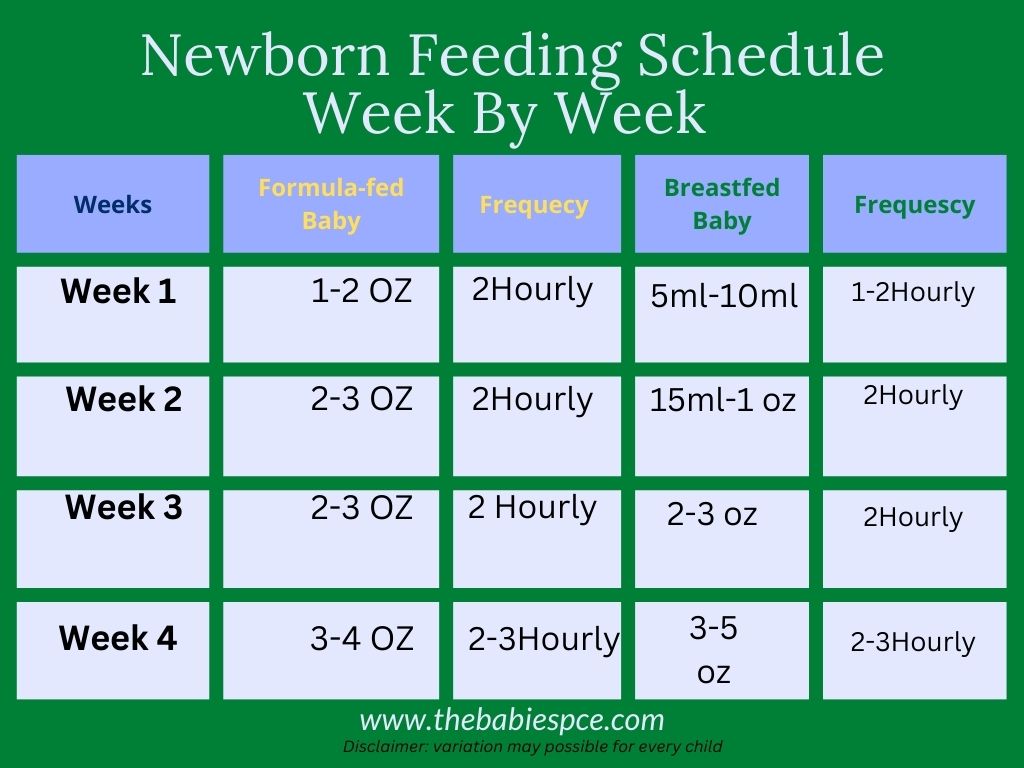Newborn Feeding Schedule Week By Week Uncovered

Last updated on May 8th, 2024 at 12:18 pm
AS new parents are often overwhelmed by every day-to-day task of the baby, especially feeding. Feeding is a big challenge for new parents because of the various associated challenges like newborn feeding schedules week by week, feeding techniques, and solutions to those problems.
Well, experts says in the early months of age newborns grow foster like gain 1-ounce weight per day.
Hence, an optimal amount of nutrition for a newborn is foremost to achieve this weight gain pace but it depends upon the choice of mom for feeding her baby.
For sure, there is no debate about the maximum benefits of breastfeeding over formula feeding.
We’re gonna enlighten a major pain point for parents’ about newborn feeding schedule week by week. Nonetheless here we’re not going to discuss the benefits of breastfeeding or formula feeding.
Keeping in mind every daunting question that comes across to every new parent about feeding their child like is my baby getting the right amount of feeds? Is my baby’s feeding schedule by age correct this blog post, we are here to answer the Newborn feeding schedule by age.

What is a common newborn feeding schedule week by week?
Here is the baby feeding schedule by age that will help you to understand the
Newborn Feeding
Week 1: Breastmilk & Formula
Week 2: Increasing Volume
Week 3: 5+ Feedings/Day
Week 4: Increasing Volume
Newborn feeding schedule formula
New parents are often curious when it comes to figuring out how much and how often their newborn should be fed. Establishing an appropriate feeding schedule for your baby doesn’t have to be complicated. With some basic guidelines, you can create a simple schedule that will help ensure your baby is well-nourished in the first months of life.
The key factor in determining a newborn’s feeding schedule is his or her individual needs. Newborns typically need to eat eight to twelve times per day, with feedings spaced every two to three hours. You may find that your baby has different eating habits—some babies may require more frequent feedings while others may go longer between meals.
Newborn feeding schedule for breastfed babies
Globally 41 % of newborn babies are exclusively breastfed. There is a high number of breastfeeding in rural areas as compared to urban. The general rule of thumb for a healthy Newborn feeding schedule for breastfed babies is on-demand feeding. Whenever the baby feels hungry feed him.
For this reason, breast milk gives more satisfaction and nourishment to the baby than formula feed. You don’t need to stick to the clock or wait for the hunger ques for feeding the child,
Newborn feeding schedule for formula feed babies
Formula feeding is a great option for newborns, and it can provide your baby with the nutrition they need as they grow. Having a schedule in place allows you to ensure your baby is getting the nutrients they need while also keeping its digestive system healthy. Here’s an overview of what to expect when it comes to a newborn feeding schedule for formula-fed babies.
A newborn’s stomach is very small and quickly filled up, so smaller but more frequent feedings are ideal. It’s recommended that babies 1-2 months old receive 2-3 ounces of formula every 3-4 hours, or about 5-6 times per day. As your baby grows, you can gradually increase the amount of formula given at each feeding and possibly reduce the number of feedings per day if needed.
4 Signs to tell if your baby is truly hungry
As a parent, it can be difficult to know when your baby is truly hungry. Many times, babies may cry or fuss due to other reasons such as being tired or needing a diaper change. To make sure you’re providing enough food for your little one without overfeeding them, here are 7 reliable signs that indicate your baby is actually hungry and in need of nourishment.
First, look out for hunger cues such as lip smacking and rooting around with their mouth or tongue. These movements usually mean they’re ready to eat!
When it comes to feeding time, if they seem eager to latch on or take the bottle right away then this is another sign that they’re genuinely hungry.
Nodding head left and right seeking momma’s breast when anyone takes him in his arms.
Additionally, if their cries become more intense after a few minutes and last longer than usual then this could indicate true hunger too.
Wrap Up:
Creating a newborn feeding schedule week by week is beneficial to new parents and their developing babies. A consistent routine not only helps the baby to eat and sleep, but it can also provide structure while mom or dad works through the overwhelming emotions of caring for a newborn.
Parenting can be daunting, but with the right resources, such as this article, it can also be an incredibly rewarding experience. With patience and dedication, parents can create a loving environment that nurtures their child’s growth and development.
Feeding schedules may be slightly different for each baby, so it is important to keep an eye on your baby’s hunger cues and discuss any concerns with your healthcare provider. It is also important to remember that breastmilk or formula nutrition should be the primary source of nutrition for infants up to one year of age so be cautious to make it in the right way about following the newborn feeding schedule week by week.






